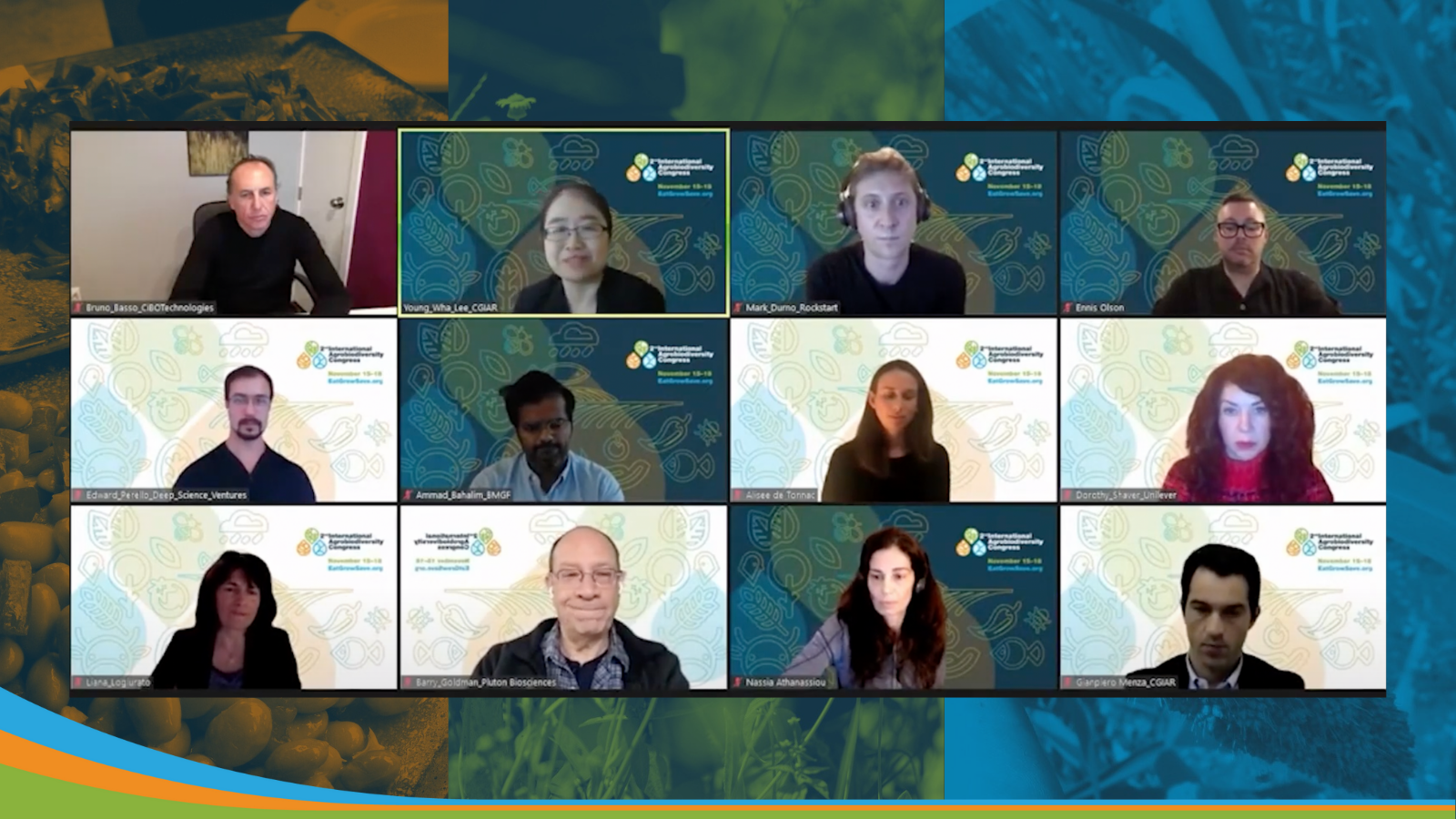Blog Watch: Innovation Forum Sparks Collaboration to Scale-up Agri-Food Tech

Recorded and available for public viewing, the Agri-Food Tech Innovation Forum (part of the recent Agrobiodiversity Congress co-hosted by the Alliance) was a pioneering meeting of the minds from across the innovation landscape to generate new solutions for scaling.
On the opening day of the 2nd International Agrobiodiversity Congress, live attendees from all over the world witnessed experts from research, startup, capital, and corporate backgrounds come together around one virtual table at The Agri-Food Tech Innovation Forum, “The Role of Venture Capital in Agricultural and Food Systems: Creating Opportunities and Scaling Up Science-Based Innovations.”
“While there is an increasing interest in science-based solutions, there is still a gap between labs and market, and a lot of innovations with a lot of market potential are stuck in a research paper or at concept stage,”
said Gianpiero Menza, Senior Partnerships and Innovative Finance Officer at Alliance of Bioversity International and CIAT / CGIAR, during the introduction to the event.
“There is an untapped opportunity here and a number of impact philanthropists, venture funds and corporate actors could play a role through cross-sectoral partnerships and by investing to further develop products and de-risk innovative research that could redesign tomorrow’s agricultural sector.”
Through the Innovation Forum, we brought these actors together to learn how best to do so.
Key Takeaways
- Scientists and startups can be more proactive in the research and innovation process by seeking out complementary collaborators (other scientific disciplines, investors, and market experts) and orienting themselves toward scaling success from the very beginning.
- Corporates and venture capital actors can get involved at the earlier stages of innovations by reaching out to universities, research institutions, etc.
- Innovators and collaborators should pursue clearly defined goals, and look through the eyes of every stakeholder – especially growers – to accelerate adoption and impact.
Venture capital investors are recognizing the promise of breakthrough science to address climate change. Frontier technologies, when they deliver on this promise, can stimulate massive changes in global production systems of all kinds (agriculture, energy, manufacturing, etc.). Food systems, especially, are due for revolutionary shifts toward sustainability and efficiency. Keynote speaker of the Innovation Forum, Roberto Viton from Valoral Investors and Partner of Yield Lab Ventures, noted how Covid-19 has triggered innovation in the sector: with efforts to bring local production closer to consumers, acceleration in the digitalization of agriculture, increased scrutiny on food safety, and renewed efforts to ensure sustainability. But even as investment booms, Viton asks, are we doing it right?
Researchers often struggle to stay the course of commercialization when faced with barriers like IP negotiation and regulatory complications. Efforts are lacking for evaluating the impact of innovations against the sustainable development goals. Obstacles like these hinder the scaling process of agri-food tech innovations.
To produce new and creative solutions to these problems, we need bridges to connect and build networks between the often-siloed roles of scientists, entrepreneurs and investors in the agri-food tech ecosystem. The Agri-Food Tech Innovation Forum did just that. Big names from trailblazing organizations joined forces to provide an enviable example of how collaborating across divides will make the difference in accelerating innovation and scaling processes. Represented among them were Valoral Advisors, Deep Science Ventures, Food@Google, Seedstars, CiBO Technologies-Flagship Pioneering, the Italian Institute of Technology, Rockstart, Pluton Biosciences, Knorr at Unilever, and the Bill & Melinda Gates Foundation.

Breeding Informatics Lead at CGIAR Young Wha Lee moderated the discussion, which was structured around three principles: sourcing and building – how knowledge and talent can be scouted and supported early; scaling – how capital can be more patient through the challenges; and venture capital’s role in impact – what can partners do together to ensure adoption, deployment and success. Panelists offered grounded wisdom and fresh takes on these points:
“I encourage the venture capitalists in the room to visit more frequently or learn more about what happens in the universities because there is quite a bit of work going on in terms of innovation,”
said Bruno Basso, co-founder of CiBO technologies, a company which came out of Flagship Pioneering and shares the same portfolio as such innovative ventures of Moderna and Indigo Agriculture. “There needs to be more of that interaction.”
“There’s still a conversation to be had around really building kind-of unified, uniform ways of communicating what needs to be done across the sector so that we can build it up from a demand perspective as well … and a way to do that is to really put energy and effort toward an external- not branded- commitment and goals,”
noted Dorothy Shaver, the global marketing sustainability lead of Knorr at Unilever.
“Try and seek out the complementary stakeholders and actors in the space, and before you know it, you're gonna have a pathway or a map to scale whatever impact or solution it is that you’re working on,”
said Mark Durno from Rockstart.
“For us as scientists it is important to have some goals to work on ... and now, an important thing is that I see companies that approach us,”
said Athanassia Athanassiou from GreenTech at the Italian Institute of Technology. “I think that what is happening now is that we put all together our efforts to bring out something greener, more sustainably, and from my point of view the SDGs help a lot. I know that there's still a lot of work that needs to be done, but it is helping because it gives us some targets and also is helping ourselves to understand what kind of technologies, we have to bring to the front to follow these goals.”
The Forum exemplifies how collaborating across science, venture, and capital boundaries will make the difference in accelerating the innovation and scaling of agri-food technologies. With more proactivity and support across the innovation ecosystem, we can build on this momentum to bring about revolutionary change in food systems while delivering on the SDGs and tackling climate change.
The Innovation Forum was hosted by Alliance/CGIAR’s Accelerate for Impact Platform: a venture-focused Research for Development space designed to bridge science and entrepreneurship. A4IP co-designs and scales agriculture and climate change science-based breakthrough technologies as well as making sure that solutions are accessible to all.
Be sure to also check out the other recorded events of the 2nd International Agrobiodiversity Congress.


